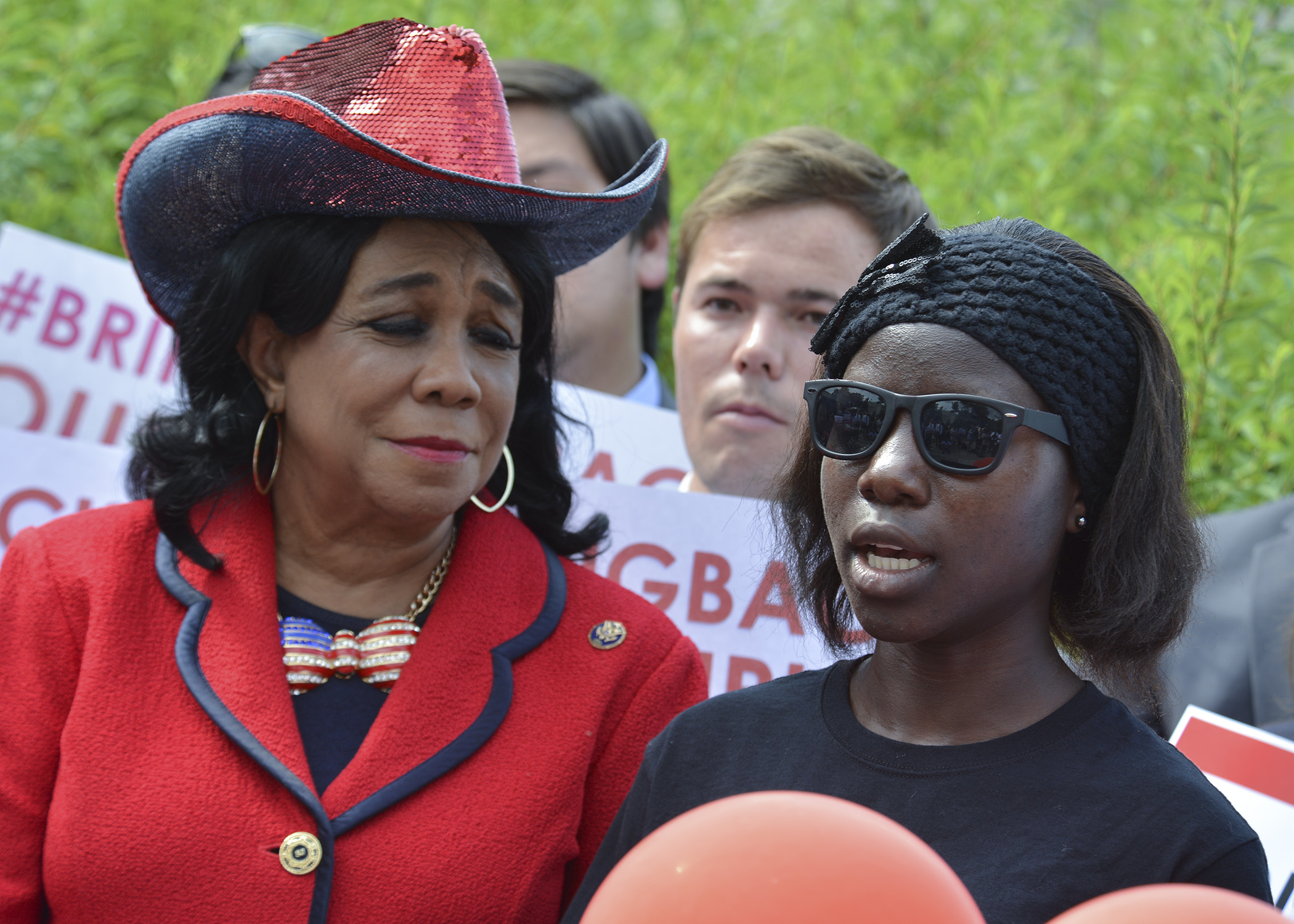
By Freddie Allen
Senior Washington Correspondent
WASHINGTON (NNPA) – This month, teenagers across the nation prepare to make the transition from high school to college and at least two of the survivors of the Boko Haram mass kidnapping in Chibok, Nigeria last year could be joining them – if they can raise the money.
Emmanuel Ogebe, a lawyer and human rights activist who worked to bring 10 of the Chibok girls to the United States following their harrowing escape from the terror group known as Boko Haram, said that he was excited when he learned that girls were accepted to college, but at this time, the group that is sponsoring the girls in the U.S. doesn’t have the resources to send them.
A few weeks ago, Ogebe launched a GoFundMe.com campaign titled, “Bring Our Girls Back-To-School” to raise $75,000 for tuition, fees and living expenses for the girls. Some of the funds will also be used to help the girls who don’t attend a four-year college go to vocational school and learn life and social skills that will enable them to live in the U.S. independently.
“For the moment, the girls have a very sheltered experience that is not fully American,” said Ogebe. “At some point, they have to encounter the ‘real’ America. Very frankly they need coping skills. They need survival skills.”
It’s one thing to go from rural America to Washington, D.C., Ogebe explained, “But the transition from rural northern Nigeria to the capital city of the United States of America is a much tougher road to travel.”
The lawyer and activist said that the challenges to the girls living on their own are both emotional and financial.
Ogebe explained: “It’s like in gardening when you plant a crawling plant, you need to put a stake in the ground for the plant to grow around. That’s the type of role we have to take. If you don’t provide the stick, they won’t develop the way they should.”
On April 14, the same day that an explosion destroyed a bus depot on the outskirts of Abuja, killing at least seven and injuring more than 100, Boko Haram abducted nearly 300 schoolgirls as they studied for exams that night from the northeastern town of Chibok in Borno state.
The mass kidnapping sparked an international social media campaign under the #BringBackOurGirls hashtag. Little information about the girls’ whereabouts has come out of the region since they disappeared with their captors into the bush more than a year ago.
Ogebe attended a meeting between some of the Chibok schoolgirls who escaped and a small contingent of lawmakers that included Representatives Frederica Wilson (D-Fla.) and Lois Frankel (D-Fla.). Ogebe said that his heart began to break as he imagined the girls returning to their town after the meeting, still living under the threat and violence of Boko Haram.
“I couldn’t live with that,” said Ogebe. “I said, ‘If anything happens to these kids, it would be on my conscious forever.’”
So, the lawyer arranged to bring 10 of the girls to the United States almost a year ago where they live with host families. Ogebe said that the girls are mostly homebodies, but some of them like swimming, most of them like cooking and they take turns braiding one another’s hair.
During a press conference about the missing schoolgirls in July, Rep. Wilson said that, according to her sources, the girls are being guarded closely by Boko Haram militants, because the terror group hopes to use them as a bargaining chip.
“And until someone can show me a mass grave where are all of these girls are or show me one of the girls has been married off or have been killed, I will continue to believe that they are still alive,” said Wilson.
Rep. Wilson continued: “We have faith and we have hope that at some point we will find those girls.”
Wilson visited the region a year ago with a small contingent of lawmakers from the United States and met with some of the girls who had managed to escape. Wilson said that they were disappointed by the lack of progress in finding the girls and the absence of any real support for the families of the abducted students.
Wilson, a former public school principal, said she was shocked when she learned about the abduction of the Chibok girls who were preparing to take exams at night, because of fear of terrorist activity in the area.
“Here these young girls are in school trying to get an education and they’re kidnapped by a terrorist group called Boko Haram. How offensive is that?” said Wilson. “If they were boys, I might be able to swallow it a little bit better, but little girls, ‘sugar and spice and everything nice?’ No.”
Wilson visited the region a year ago with a small contingent of lawmakers from the U.S. and met with some of the girls who had managed to escape. Wilson said that they were disappointed by the lack of progress in finding the missing girls and the absence of any real support for the families of the abducted students.
With the recent election of President Muhammadu Buhari, U.S. lawmakers hope that he shows more determination in finding the girls and to ending violent extremism in the western African nation.
“Nigeria now has the opportunity, under the new leadership of their new president for renewed efforts to bring our girls home and to end Boko Haram’s brutal campaign of terror,” said Rep. Frankel.
Last month, White House officials announced plans to work with Congress to provide $465 million in aid for training, equipment and capacity building to African nations to assist them in their counterterrorism efforts during the 2015-2016 fiscal year. The U.S. government also planned to increase support to Nigeria, Niger and Chad through youth and sports programs to boost social and civic engagement in areas besieged by Boko Haram.
Ogebe said that the geography and tactics of the terror group pose incredible challenges to what the Nigerian military can do on its own.
“The territory is a tough one,” said Ogebe. “Boko Haram is using land mines in Sambisa Forest against the military.”
Because the Sambisa Forest shares borders with several neighboring countries, Boko Haram is able to trek back and forth across international borders illegally, a travel pass not afforded to the Nigerian military.
“The military is limited by constraints that don’t limit the terrorists,” said Ogebe. “This is why the search requires a global coalition.”
Going by her first name to protect family and friends still living in northeastern Nigeria, Lili, one of the rescued girls who is still in high school, said that going to school in the U.S. is safer, because no one is threatening you.
“Going to school here is better than Nigeria, because here there is peace,” said Lili, adding that she doesn’t know when she’ll return to Chibok.
“When it is safer, maybe,” said Lili. “When Boko Haram is gone.”
Even though the fall semester will be underway in a matter of weeks, Ogebe said that he hopes to raise enough money so that the girls who got accepted into college can attend this semester.
“We don’t know what has become of the 219, but we do know what the 10 can become,” said Ogebe. “We can help them achieve their dreams and let them be an example to the world.”
On August 12, the Reuters news agency reported that Boko Haram militants launched an attacked just outside of Maidguri in Borno state, north of Chibok. Six people were killed in the raid and Ogebe said that he’s waiting to hear if any friends or family members of the Chibok girls were among the dead.
Now that Boko Haram has pledged allegiance to the so-called Islamic State in Syria (ISIS), human rights advocates hope that stamping out the terror group that continues to ravage western Africa becomes an international priority.
“When it comes to global terror, Black lives matter, too,” said Ogebe. “And we need to work to put this horrific group out of business.”
(To learn more about the “Bring Our Girls Back-To-School” fundraising campaign, visit http://www.gofundme.com/rux936pg.


